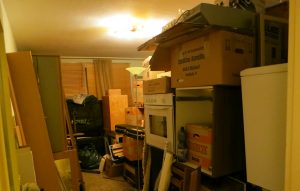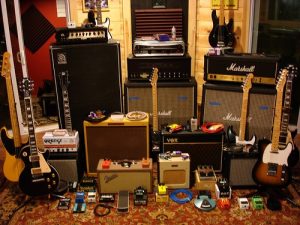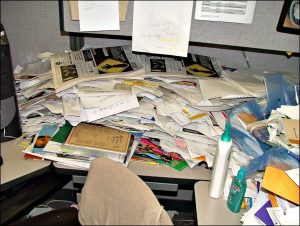| Average Australian home* | $4000 a year* |
|---|---|
| Smart renter | Under $1000 a year |
| Very smart renter | Under $500 a year |
*We’ve estimated that the average Australian home needs at least one additional room to store unwanted or unneeded clutter at a cost of at least $50 per week and we have added $620 a year for unwanted gifts and $600 a year for unused items based on a 2017 insurance company report [1]. We’ve also added additional cleaning, storage and moving costs.
Renters can turn clutter into an advantage: if you own your home, you may be too attached to it to consider downsizing if decluttering removes the need for a room or two, but as a renter, it’s easier to move to a smaller and cheaper property after you declutter.
Houses are a magnet for clutter with their drawers and cupboards, something that is problematic come moving time. Not only that, clutter wastes a lot of time in extra cleaning, reorganising, tidying up and generally just looking for things you can’t find [2][3].
Luckily, with a little time and effort, you can clear the stuff in your home that’s not of any use to you. Not to mention, if you can master the art of decluttering as a renter, you may save a fortune as a future home owner by buying a smaller home.

We’ll like to add a personal story here:
In early 2019, we moved to a smaller place and got rid of 20% of our stuff. We gained $2000 in the sales of goods, saved another $1000 by repurposing an unused bike rather than buying another one and we now save $3120 a year because of lower renting costs.
Our home also feels so much nicer; we know where everything is and don’t feel bad about stuff not getting used. And the funny thing is, we didn’t realise that we had so much clutter in the first place.
There’s many ways to declutter a house so we don’t want to be dogmatic about it but here’s what we can share from our experience:

“Compound Collection” by Roadside Guitars is licensed under CC BY-SA 2.0
- We went around the house and found areas of clutter and made a list of what needed to be done. This breaks decluttering down into some simple steps.
- When we had some spare time, we attacked a room, drawer or cupboard.
- Whatever had sellable value was sold.
- Whatever was not worth selling (but still had value) was given to friends and family who wanted these items or they were donated to a local op shop.
- Rubbish and recycling were cleared out. For a change both bins were full for a month. Special plastics and electrical waste were taken to a recycling facility that handles these goods.
- We found that out of everything you get rid of, you might need to buy back 10% of it in the future. For hoarders, this can ease your mind; whatever you get rid of, the value of what you sell will far outweigh the cost of buying something back if you need it in the future.
- Decluttering was a great way to put old projects to rest that we were no longer engaging in.
Once you declutter things, here’s some ways to prevent it getting back in:

“World’s Messiest Office Cubicle Discovered in Colorado” by Jeffrey Beall is licensed under CC BY-ND 2.0
- Deal with things like paperwork and bills straightaway. For example, if we get a letter it is acted on or filed away.
- Have a small box for items to go. Clutter will always try to worm its way back in so you can have a small box where things can go that are no longer needed. If they are still in the box after 6 months, they get sold, given away or disposed of.
- Unless there’s something we need straightaway, we’ll wait a few weeks before buying it. Sometimes you’ll find another way to meet that need or might find you didn’t need the item at all. This has happened to us on many occasions and it prevents today’s purchases from becoming future clutter.
- If you often get unwanted gifts from friends and family (and possibly give them in return), have a talk with them about the possibility about giving each other time rather than gifts.
- We still give gifts to the youngest members of our extended family as receiving gifts for Christmas and birthdays is exciting for kids, but the adults have agreed that we don’t need to buy gifts for each other.
- Shopping and decluttering are sworn enemies. By this, we mean shopping for the sake of shopping. There are many of life’s joys that leave you with a lasting sense of enjoyment rather than the empty feeling you get after a trip to the mall.
- Instead of storing moving boxes which can take up a fair bit of room, boxes can be hired. For our last move, we spent $70 on hired moving boxes which included delivery and pick up.
Joshua Becker’s book “The More of Less” was quite helpful in our process of decluttering and in the spirit of decluttering, we borrowed it from the local library instead of buying it (don’t worry, authors still get royalties for library book loans in Australia).
No matter how well you declutter, you may still lose some money to unwanted purchases, but this should be minimal.
Further Reading:
[1] https://www.choosi.com.au/blog/lifestyle/clutter-report [2] https://www.becomingminimalist.com/clutter-stats/ [3] https://zeenews.india.com/home/women-spend-8-years-of-their-life-shopping_338599.html